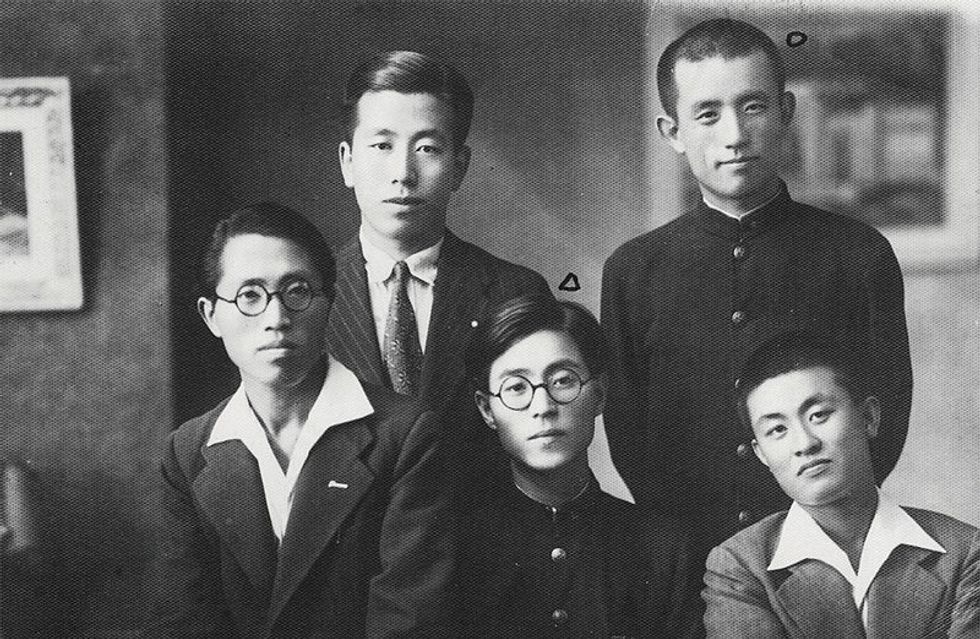A Portrait of a Poet

To start off this series is an inspirational and charming poet of the name Yun Dong-ju. But first, in order to understand his poems and Yun himself, you need to know a little bit about the political and domineering climate he was raised in.
On August 29, 1910, Japan overtook Korean after years of war. During this period, the Korean people were stripped of their identity. They were told they were no longer their own people and were forced to follow the ways that their new Japanese rulers had set for them. Historical monuments were torn down or converted into tourist attractions for the Japanese people. Thousands of Korean historical books were burned and universities had to teach their students from approved texts by the Japanese government. The Korean people were told that speaking their language was illegal and they could no longer be called by their Korean names. Countless resistance groups were formed in Korean universities and experienced widespread popularity amongst the Korean people with the purpose of Korean Liberation. This was a period where Korean history and society could have been erased right before their eyes.
On December 30, 1917, Yun was born in a village in northern Manchuria. He was raised in a heavily patriotic Korean household and went to a school with the same values. At a very young age, Yun was able to cultivate his love for literature and writing. At age 12, he wrote and published children's poems in a town paper with the help of his close friend and cousin Song Mong-kyu. Throughout Yun's high school years he wrote poems, publishing them in school and church newspapers.
When he graduated, he decided to attend Yon-hee College in Seoul, now Yonsei University, with a major in Literature. It was in college that Yun directly experienced the tangible fear and pain of his people and began expressing that suffering in his poems. Yun's poems are riddled with his love and compassion for his people, country, history, and even himself. He wrote in a way that evoked a powerful sense of unity with his people. Each poem was as beautiful and profound as the next. He continued writing as he moved from house to house to avoid the Japanese police believing he was a part of the resistance movement due to him and his cousin's close relationships to known resistance members.

In 1942, Yun started another academic journey in Tokyo, Japan at Rikkyo University. There he studied English Literature alongside his cousin Song Mong-Kyu in the Western History department. On July 14, 1943, Yun and his cousin were arrested with the charge of participating in the resistance movement against Japan. He continued to write in prison, however, his works were confiscated by the police and he was forced to translate them into Japanese. He was later convicted as being a part of the "independence movement" and was given a two year sentence. On February 16, 1945 at age 28, Yun Dong-ju died in prison reportedly due to chemical experimentation that had been conducted on prisoners. One month later, his cousin and life-long friend Son Mong-kyu also died in prison.
Korea received independence from Japan in August of 1945, six months after his death. Yun Dong-ju spent his entire life under Japanese rule, never able to see his country free. He wrote of a profound desire for freedom, and used rich metaphors and imagery that are crystal clear even now to the reader's eyes. This kind and well-mannered man never saw his poems published or how well it has been received. Today, he is considered one of the most influential and studied poets in South Korea and has a museum dedicated to his writing and preservation of Korean literature.
In his most well-known poem Foreword, his compassionate and loving nature shines bright, captivating readers since 1948.
Foreword
Until the day I die
I long to have no speck of shame
when I gaze up toward heaven,
so I have tormented myself,
even when the wind stirs the leaves.
With a heart that sings the stars,
I will love all dying things.
And I will walk the road
that has been given to me.
Tonight, again, the wind brushes the stars.
November 20, 1941












